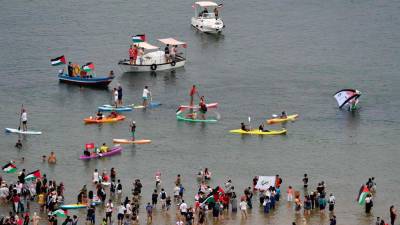PETALING JAYA: The Global Sumud Flotilla (GSF) may be carrying only a modest cargo compared with large-scale United Nations (UN) convoys, but its voyage carries significant political weight that could help secure more predictable access into Gaza, an international relations expert said.
The flotilla, which is carrying food, medicine and a symbolic message of peace, includes volunteers from Europe, Asia, South Africa, Latin America and the Middle East, with 34 Malaysians forming one of the largest national contingents on board.
International Islamic University Malaysia Assoc Prof Dr Mohd Yazid Zul Kepli said GSF should be seen as a civil society initiative sailing alongside the formal aid system, not a replacement.
“The flotilla’s real contribution is not measured in tonnes of cargo, but in its ability to highlight obstacles to aid and pressure states to open safe corridors.”
He noted that most humanitarian relief for Gaza still moves through UN-run land routes and the Cyprus-based “Amalthea” maritime corridor, both subject to strict inspection and handover procedures.
“In contrast, GSF is a symbolic voyage. It reminds the world that access is blocked and ordinary people are willing to risk their lives to break the siege,” he said.
Mohd Yazid also highlighted Malaysia’s role as a donor, advocate and facilitator in aid to Gaza.
“As a donor, Malaysia has pledged millions, including an additional US$25 million
(RM118 million) for Gaza relief at the UN General Assembly this year.
“As an advocate, the government has demanded safe passage for the flotilla and condemned threats against it.
“And as a facilitator, Malaysian NGOs have moved tonnes of aid through Jordan and continue to send medical teams,” he said.
He added that Malaysia’s 2023 ban on Israeli-flagged or Israel-bound ships was another example of policy being used to signal the costs of maintaining the blockade.
Mohd Yazid said to strengthen international coalitions, Malaysia should anchor its efforts within the UN system while bridging initiatives by the Organisation of Islamic Cooperation (OIC) and the European Union (EU).
“Malaysia could help scale up the Cyprus maritime corridor, to second staff to the UN’s deconfliction teams and push for guaranteed daily truck access across all Gaza regions,”
he said.
He also urged Malaysia to translate public solidarity into system-wide impact by directing donations through fast UN funds, such as the Occupied Palestinian Territory Humanitarian Fund and the Central Emergency Response Fund.
“Symbolic missions such as GSF matter, but they should be aligned with UN needs and eventually hand cargo over to trusted partners, such as the World Food Programme.
“That way, public pressure is translated into real deliveries on the ground,” he said.
He noted that while the UN, OIC and EU have helped keep Gaza’s aid
system functioning, deliveries still remain severely constrained.
“Thousands of tonnes have gone through Kerem Shalom (the crossing between the Gaza Strip and Israel), yet repeated closures, looting and security restrictions mean that clinics and kitchens are still shutting down,” he said.
Despite the UN’s US$4 billion (RM17 billion) appeal, only a quarter of the funds have been raised. The World Food Programme estimates that Gaza requires hundreds of truckloads daily.
“Civil society missions such as GSF cannot fill this gap in volume or money, but they could shine a light on systemic failures and nudge states to act. The real issue is not the availability of aid as supplies exist nearby.
“The problem is political will, especially the unwillingness of world leaders to act decisively while the United States continues to shield Israel,” he said.
As of press time, GSF announced that its vessels were around 121 nautical miles (225km) from Gaza, nearing the point where past flotillas were intercepted or attacked.
In a statement on Telegram, organisers said unidentified vessels, some with their lights off, had approached the flotilla before moving away after participants activated security protocols.
“We continue to sail to Gaza, approaching the 120 nautical mile mark. We are all prepared for the moment of interception, whether tonight or tomorrow,” said flotilla spokesperson Wael Naouar.
Reports from on board noted a sharp increase in surveillance, with reconnaissance drones flying overhead and intensified jamming of internet and radio signals.
